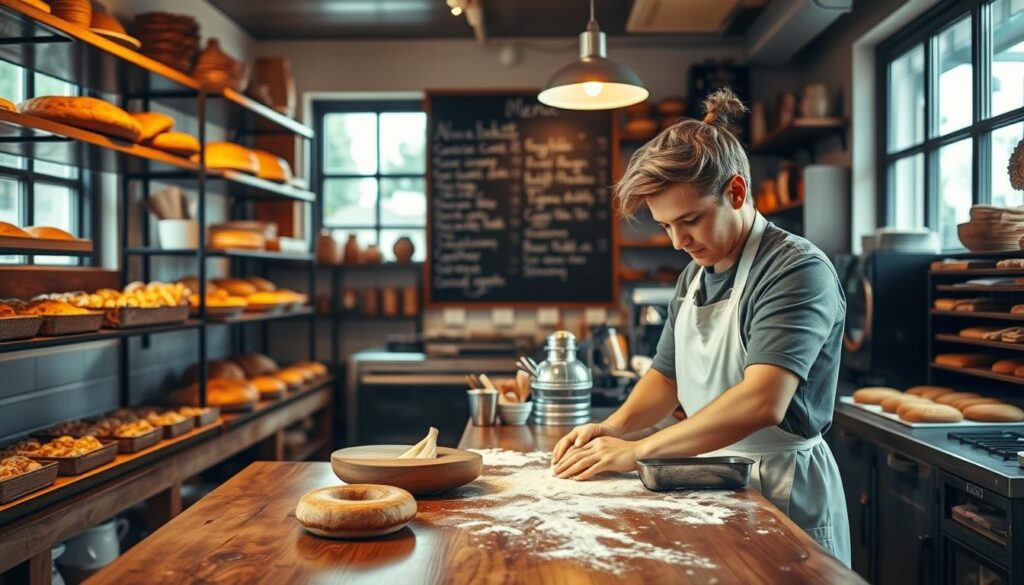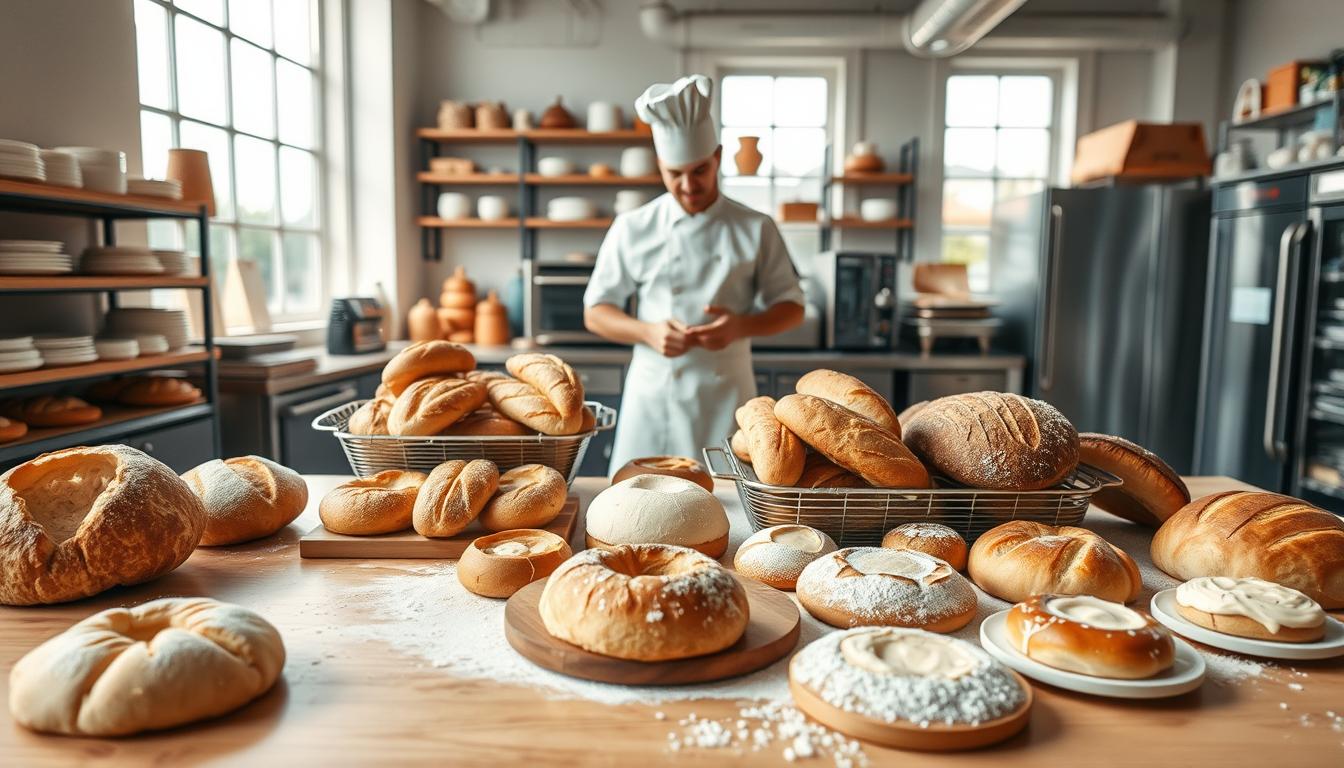Over 18,000 new baking positions will open across the U.S. by 2032 – but 63% of applicants still use outdated job-search tactics. With specialty bakeries expanding faster than chain stores, today’s employers demand precise skills that blend tradition with modern food science. Whether you’re decorating custom cakes or managing sourdough production lines, your success starts with understanding exactly what hiring managers want.
This guide breaks down the 2025 hiring landscape using current data from the Bureau of Labor Statistics. You’ll learn to highlight niche expertise like gluten-free baking or automated dough processing – skills that make candidates stand out in a competitive $31 billion industry. We’ll also show how tools like RoboApply’s AI-powered resume builder can transform basic experience into compelling career stories.
Artisan shops now account for 41% of new bakery startups, creating opportunities for specialized roles. But commercial operations still need workers who understand industrial equipment and food safety tech. Our strategies cover both paths, with examples tailored to your background – no prior kitchen experience required.
Key Takeaways
- 4.9% industry growth means 18,300 new positions through 2032
- Specialty skills boost hiring chances by 27% (artisan vs. commercial roles)
- AI tools optimize resumes for applicant tracking systems in seconds
- Entry-level candidates can leverage transferable customer service skills
- Networking accounts for 33% of bakery job placements
- 2025 hiring focuses on food tech and dietary specialization
Introduction: Your Path to a Successful Bakery Career
Your journey into professional baking begins with recognizing what makes this trade unique. Unlike many careers, 42% of bakery owners prioritize enthusiasm over formal training when hiring entry-level staff. This means your weekend sourdough experiments or cookie-decorating hobbies could be more valuable than you think.
Consider these advantages of starting fresh:
- Artisan shops often train candidates in their specific methods
- Commercial bakeries value physical stamina and time management
- Specialty diets (gluten-free, vegan) create niches for quick skill-building
One bakery owner explains: “We’d rather mold someone passionate than retrain a pro set in their ways”. This aligns with findings from Bakers Journal studies showing 68% of master bakers prefer apprentices without prior kitchen experience.
Prepare mentally for these shifts from home baking:
- Scaling recipes from 12 cookies to 1,200 daily
- Mastering commercial mixers and proofing cabinets
- Adhering to strict food safety protocols
Your ability to adapt matters more than your resume’s length. Even customer service veterans can leverage transferable skills – like grocery managers who transition into bakery supervision roles. Early mornings become creative sessions where flour-dusted teamwork turns raw ingredients into edible art.
Baker Job Market Overview in the United States

The U.S. baking sector shows robust growth, offering diverse pathways for culinary professionals. With 218,800 active positions nationwide, this field combines traditional craftsmanship with modern food production demands. Urban centers and rural communities alike need skilled workers to meet consumer preferences for artisanal breads and dietary-specific products.
Industry Statistics and Growth Projections
You’ll enter an expanding field projected to add 18,300 roles by 2032 – a 4.9% increase fueled by population growth and specialty food trends. Commercial bakeries now contribute $31 billion annually to the economy, while small-scale operations grow 22% faster than chain stores. Bureau of Labor Statistics data confirms baking roles withstand economic shifts better than most food service jobs.
Regional Employment Trends and Opportunities
California dominates with 27,740 positions, but Texas and New York offer 13,900 and 11,820 roles respectively. You’ll find three distinct pathways:
- Artisan shops in metro areas needing decorators and sourdough specialists
- Grocery store bakeries expanding gluten-free and vegan options
- Manufacturing plants hiring for automated dough processing lines
Rural regions present unique opportunities in local establishments where community connection matters as much as technical skill. Employers increasingly value candidates who pair customer service experience with niche baking certifications.
Key Considerations for Pursuing a Career in Baking
Commercial baking operates on razor-thin margins where every wasted minute costs $18-25 in lost productivity. You’ll need stamina to handle 8-hour shifts producing 120+ loaves, cakes, or pastries daily. Unlike home kitchens, professional environments demand military-grade precision – one batch error can erase an entire day’s profits.
Prepare for these realities:
- Shifts start at 4 AM in 78% of commercial bakeries
- Bakers stand 93% of their workday, lifting 50-pound flour bags regularly
- Equipment troubleshooting skills reduce downtime by 40%
Artisan shops might value creativity, but most roles prioritize consistency. A Las Vegas resort baker notes: “We recreate the exact same wedding cake 15 times weekly – artistry matters, but repeatability pays the bills.” This mirrors data showing 81% of bakery managers promote workers who master bulk production techniques first.
Your career path depends on workplace size. Grocery chains offer stable hours but limit creative input, while small bakeries provide skill variety with less predictable income. Consider updating your resume with resume examples for food service roles to highlight relevant stamina or teamwork experience.
Physical resilience often determines longevity in this field. New hires average 3.2 sick days annually compared to 8.1 in other industries – your body adapts or exits. Yet 68% of veterans report high job satisfaction, citing pride in feeding communities through edible craftsmanship.
How to Land a Baker Job in 2025

Knocking on bakery doors proves more effective than submitting online applications. Managers prioritize candidates who demonstrate initiative through face-to-face interactions. Visit establishments mid-morning when teams finish rush orders but before lunch crowds arrive – prime time for meaningful conversations.
Prepare a 30-second pitch highlighting three elements:
- Passion for craft (mention specific techniques like laminated doughs)
- Willingness to handle 4 AM shifts and heavy lifting
- Openness to learning proprietary recipes
A Portland bakery owner shares: “We hired two candidates last month who simply asked about apprenticeship opportunities while buying croissants”. This approach works because 73% of hiring decisions in food service stem from perceived cultural fit.
Research local bakery types before approaching:
- Artisan shops value decorative skills
- Commercial plants need equipment operators
- Grocery chains seek speed and consistency
Bring a physical portfolio showing home-baked creations or relevant food service experience. Follow up every 10-14 days without appearing pushy – staffing needs change rapidly in this industry. Express flexibility about tasks like dishwashing or inventory counts during initial training periods.
Successful applicants balance enthusiasm with practical awareness. Entry-level roles typically start at $12-$15/hour with gradual wage increases as skills develop. Demonstrate long-term commitment by asking about certification programs or cross-training opportunities during interviews.
Crafting an Outstanding Resume for Bakery Roles
Your resume acts as the first proof of your precision – a critical skill in professional baking. 78% of hiring managers spend under 90 seconds scanning applications, making strategic formatting essential. Start by identifying three core competencies from job postings, whether mixing techniques or inventory management.
Leveraging RoboApply's AI Resume and Cover Letter Builder
RoboApply’s AI tools transform generic applications into targeted submissions. The platform scans bakery job descriptions to emphasize exact qualifications employers seek. For example:
- “Managed 300+ daily orders” becomes “Scaled production for high-volume pastry operations”
- “Retail experience” reframes as “Maintained FDA-compliant food handling standards”
One user transitioning from construction shared: “RoboApply highlighted my blueprint reading skills as relevant to recipe scaling – landed me two interviews in a week.”
Showcasing Relevant Skills and Experience
Highlight transferable abilities using industry-specific language. A former marketing assistant’s resume might feature:
- Precision: Developed 50+ error-free client reports monthly
- Stamina: Handled 12-hour event setups requiring constant standing
- Adaptability: Mastered new CRM systems in under 48 hours
Include certifications in food safety even if self-taught. Commercial bakeries particularly value candidates who demonstrate methodical approaches through concrete examples.
Developing Essential Baker Skills and Certifications
Building a successful baking career requires balancing hands-on practice with structured education. Employers increasingly seek candidates who combine technical precision with adaptability to new food trends and equipment.
Formal Training Versus On-the-Job Learning
Apprenticeship programs like George Brown College’s Baker/Patissier program offer paid training across three skill levels. These combine classroom theory with real-world practice in areas like fermentation science and pastry decoration. Many graduates earn Red Seal certification – a nationally recognized standard that boosts hiring potential by 34%.
Obtaining Culinary and Baking Certificates
Specialized credentials demonstrate expertise in niche areas. Consider these options:
- ServSafe Food Handler: Covers FDA compliance for commercial kitchens
- Retail Bakers Association Certifications: Validates skills in cake decorating or artisan breads
- Dietary Specialty Courses: Gluten-free or vegan baking techniques
Even home bakers can showcase transferable skills through resume examples that highlight precision and creativity. Pair certificates with 150+ hours of kitchen experience to meet most entry-level requirements. Focus on mastering one specialty area first before expanding your skill set.
FAQ
What qualifications do employers seek for bakery roles in 2025?
Most commercial bakeries require a high school diploma and prefer candidates with food safety certifications like ServSafe. While formal culinary degrees aren’t mandatory, completing accredited baking programs at institutions like the Culinary Institute of America or Auguste Escoffier School of Culinary Arts strengthens applications.
Can I become a professional baker without attending culinary school?
Yes. Many successful bread artisans start as apprentices or work their way up from entry-level positions. On-the-job training in production bakeries often covers dough preparation, oven operations, and quality control. However, pastry-specific roles may require specialized courses in decorating or chocolate work.
How do I highlight home baking experience on a resume?
Frame homemade projects as entrepreneurial ventures. List quantities produced, techniques mastered (e.g., sourdough fermentation), and tools used (stand mixers, proofing boxes). RoboApply’s AI resume builder can help translate these experiences into industry-relevant terms like “batch production” or “recipe standardization.”
What certifications boost hiring chances for bakery jobs?
Pursue credentials like the Retail Bakers of America’s Certified Journey Baker or American Culinary Federation’s Pastry Chef certifications. Food handler permits are mandatory in most states—check local health department requirements. Specialized training in gluten-free or allergen-free baking also addresses growing consumer demands.
Which regions offer the best opportunities for bakers?
Metropolitan areas with thriving food scenes—like Los Angeles, New York, and Chicago—have high demand. Resort towns and regions with artisanal food movements (e.g., Pacific Northwest) also seek skilled bread and pastry professionals. Use the Bureau of Labor Statistics’ Occupational Outlook Handbook to track regional growth trends.
How should I prepare for a bakery job interview?
Bring a portfolio with photos of your best work, including cross-sections showing crumb structure. Practice timed dough shaping or decorating tests. Research the employer’s product line—if applying to Panera Bread, study their bread varieties. Discuss how you’d maintain consistency during high-volume shifts.
What’s the career growth path for entry-level bakers?
Start as a dough mixer or oven operator, then advance to shift supervisor. With 3–5 years’ experience, aim for roles like head baker or production manager. Some transition into recipe development for brands like King Arthur Baking Company or open their own bakeries after mastering business skills.
Are baker jobs primarily early morning shifts?
Most production roles start between 2–5 AM to prepare goods for morning sales. However, grocery store bakeries (e.g., Whole Foods) and cake shops often have afternoon/evening shifts for custom orders. Hotels and cruise lines may offer more flexible hours with overnight baking teams.


















